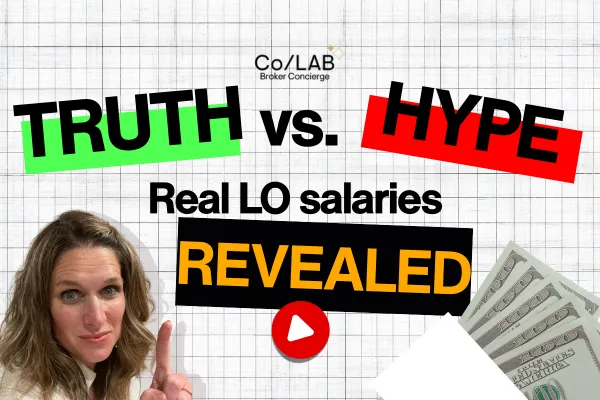BLOG
Mortgage, Real Estate, and Entrepreneurship


The Real Reasons Loan Officers Switch Mortgage Companies
The Real Reasons Loan Officers Switch Mortgage Companies (and How to Spot Red Flags Before You Move)
If you’re a loan officer who feels like you’ve hit a ceiling at your current mortgage company—or maybe you feel like you’re not even appreciated for the value you bring—you’re not alone.
I talk to loan officers every single week, and I hear the same frustrations over and over again:
“I’m not making what I should be.”
“The support I was promised doesn’t exist.”
“I don’t want to jump ship again, but I know I can’t stay where I am.”
If that’s where you’re at right now, I get it. I’ve been there. And trust me—you’re not crazy for being skeptical. Too many companies in this industry promise the world, only for you to find out that the 90% split is really closer to 60% after hidden fees, or that “marketing support” is just a generic flyer you could have made in Canva.
That’s exactly why I started this channel and the businesses I now run—to help loan officers and mortgage broker owners cut through the smoke and mirrors. I’ve guided hundreds of loan officers through company changes, and I’ve seen every trick in the book. The ones who thrive are the ones who ask tough questions, demand transparency, and refuse to settle for vague promises.
So in this article, I’m going to walk you through:
Why top loan officers really make a move
The recruiter tricks you need to know
Five questions that will expose the truth
Real stories of loan officers who got burned
Red flags vs. green lights when considering a switch
My top strategies to protect yourself before you sign anything
And at the end, I’ll answer some of the most common questions I get from loan officers who are thinking about making a change.
Why Loan Officers Really Switch Mortgage Companies
Let’s be real—it’s not always about chasing a bigger split. Most loan officers I talk to leave because:
They’ve hit an income ceiling and hidden costs eat away at their paycheck.
They’re undervalued by their current company.
They’re fed up with broken promises about support, leads, or growth.
They’re tired of the compliance and tech headaches that make it harder to close loans instead of easier.
If this sounds familiar, I promise you—you’re not the only one. And being cautious isn’t paranoia. It’s wisdom.
👉 Related read: The Real Cost of Opening a Mortgage Brokerage: 5 Mistakes That Will Drain Your Profits
The Tricks Recruiters Use (and What They Really Mean)
Recruiters know how to sell the dream. But once you’ve been in the trenches, you learn to listen for what’s not being said.
What they say: “You’ll get a 90% split.”
What it really means: After compliance, admin, tech, and marketing deductions, you’re taking home 60%.
What they say: “We’ll provide tons of leads.”
What it really means: You’ll get recycled leads that 10 other loan officers already called.
What they say: “We provide full marketing support.”
What it really means: You’ll get a flyer template. The rest is on you.
Honest companies are different. They don’t just tell you—they show you. They’ll introduce you to their loan officers. They’ll share real commission breakdowns. They’ll even invite you to sit in on training so you can see how they really operate.
👉 Related read: NEXA Mortgage vs. True Ownership: Why Loan Officers Need to Look Beyond the Branch Model
5 Questions Every Loan Officer Should Ask
Here are the five questions I tell every loan officer to ask before making a move:
Can you show me the average monthly income for loan officers hired in the last year?
Not just top producers—show me beginners, mid-level, and high performers. If they can’t provide this, that’s a red flag.
What’s the full breakdown of fees?
Processing, tech, E&O, LOS, credit reports—everything. Ask for a bill.
Can I speak to two or three loan officers who joined in the last year (not just top producers)?
You want to hear real feedback from people at all levels.
Can I sit in on one of your trainings or team meetings?
Transparency means letting you experience their support in real time.
Can you show me how you would handle this real-world scenario?
Take a situation you’ve faced in your current role and ask them to walk you through how they’d respond—then put it in writing.
👉 Related read: How to Set Up a Mortgage Broker Business the Right Way
Real Stories From Loan Officers
Let me share a few real (but anonymous) examples:
Sarah: Promised an 85% split. In reality, she nets 55% after $1,600 is deducted per file for “back office operations.”
Mike: Left retail for a brokerage that only had access to five wholesale lenders. Instead of more freedom, he got fewer options.
Jennifer: Took a $200,000 signing bonus with a three-year lock-in. Now she’s losing about $100,000 annually because of poor service—but she can’t leave.
The bottom line? It’s never just about the split.
Red Flags vs. Green Lights
Here’s how to spot hype from honesty:
🚩 Red Flags
Pressure to sign quickly
Dodging references or hard data
Overpromises on income or leads
Vague answers on fees
Badmouthing your current company
✅ Green Lights
Transparent fee breakdowns
Multiple references provided
Invitations to trainings or meetings
Realistic timelines (no pressure)
Willingness to put everything in writing
Strategies to Protect Yourself
Before you sign, here are the strategies I always recommend:
Get everything in writing—splits, fees, support, leads.
Talk to multiple people, not just recruiters or top producers.
Negotiate a 90-day trial period or exit clause.
Keep your network warm and don’t burn bridges.
Plan your “divorce” before you marry—make sure you know how you’ll exit if it doesn’t work out.
Your reputation is your most valuable asset. Protect it.
Frequently Asked Questions (FAQ)
1. How do I know if a mortgage company’s offer is too good to be true?
If it sounds unbelievable—like sky-high splits with “no fees” or unlimited leads—it probably is. Ask to see proof: actual commission breakdowns, real lead samples, and references from loan officers who aren’t top producers.
2. Should I take a signing bonus if it’s offered?
Be very careful. A big upfront bonus often comes with strings attached, like long lock-in periods or restrictive contracts. You might end up losing more in the long run than you gained upfront.
3. How do I compare different mortgage companies fairly?
Make a side-by-side comparison. Look at net income after fees, lender access, support, compliance, and culture—not just the headline split.
4. Is it better to move to a brokerage or stay in retail?
It depends on your goals. Brokerages usually offer more flexibility and options, but they also come with more responsibility. Retail can be comfortable, but it may cap your income and independence.
5. How do I avoid burning bridges when I leave my current company?
Keep it professional. Don’t badmouth your old company, and don’t oversell your new one until you’ve been there long enough to feel confident. Your reputation will follow you.
Final Thoughts
Switching mortgage companies is a big deal. It can open doors to more income, more freedom, and a better career—but only if you cut through the hype and make your move carefully.
Trust, but verify. Ask the tough questions. And remember: the wrong move can cost you income and credibility, but the right move can completely transform your business.
If you’ve got an offer on the table and want a second opinion—or if you just want help spotting the difference between real opportunity and recruiter hype—I can help.
👉 Click here to schedule a free consultation with me. No fluff. No pressure. Just clarity.
Megan Marsh
CEO/ FOUNDER of Co/LAB Broker Concierge
In Case You Missed Our Previous Blogs & YouTube Videos..
Read Here: The Real Wealth Divide: Why Loan Officers Who Own Their Business Build More Wealth Than W2 Employees
Most loan officers tell their clients to stop renting and start owning—but are you “renting” your career by working for someone else? This article exposes the real wealth divide between W2 employees and business owners, and why loan officers who own their brokerages build exponentially more wealth than those who stay on payroll. From taxes and equity to scalability and net worth, discover the five game-changing reasons why it’s time to stop cashing commission checks for someone else and start building lasting wealth for yourself.
Read Here: The Real Cost of Opening a Mortgage Brokerage: Mistakes to Avoid
Opening a mortgage brokerage isn’t just about licenses, tech, or hiring—it’s about avoiding the costly mistakes that drain profits before you even realize it. In this blog, let's pull back the curtain on the five biggest money traps new brokers face, from bloated payrolls and bad vendor choices to running your shop like an LO instead of a true business. Packed with real-world lessons, hard-earned insights, and practical strategies, this guide shows you how to avoid the landmines, protect your profits, and build a brokerage that actually makes money.
Mortgage Broker Support
Need help starting your mortgage business? Our Mortgage Broker Concierge Team is here to assist you!
If you’re curious about how we can help you simplify your operations beyond what our videos offer and want to know how you can make launching or running your brokerage stress-free, the link below explains everything. No fluff, no “exclusive training” gimmicks—just a straightforward way to see how we work with brokers to take backend tasks off their plates. Check it out here: https://colablendingfranchise.com/book-a-discovery-call

The Real Reasons Loan Officers Switch Mortgage Companies
The Real Reasons Loan Officers Switch Mortgage Companies (and How to Spot Red Flags Before You Move)
If you’re a loan officer who feels like you’ve hit a ceiling at your current mortgage company—or maybe you feel like you’re not even appreciated for the value you bring—you’re not alone.
I talk to loan officers every single week, and I hear the same frustrations over and over again:
“I’m not making what I should be.”
“The support I was promised doesn’t exist.”
“I don’t want to jump ship again, but I know I can’t stay where I am.”
If that’s where you’re at right now, I get it. I’ve been there. And trust me—you’re not crazy for being skeptical. Too many companies in this industry promise the world, only for you to find out that the 90% split is really closer to 60% after hidden fees, or that “marketing support” is just a generic flyer you could have made in Canva.
That’s exactly why I started this channel and the businesses I now run—to help loan officers and mortgage broker owners cut through the smoke and mirrors. I’ve guided hundreds of loan officers through company changes, and I’ve seen every trick in the book. The ones who thrive are the ones who ask tough questions, demand transparency, and refuse to settle for vague promises.
So in this article, I’m going to walk you through:
Why top loan officers really make a move
The recruiter tricks you need to know
Five questions that will expose the truth
Real stories of loan officers who got burned
Red flags vs. green lights when considering a switch
My top strategies to protect yourself before you sign anything
And at the end, I’ll answer some of the most common questions I get from loan officers who are thinking about making a change.
Why Loan Officers Really Switch Mortgage Companies
Let’s be real—it’s not always about chasing a bigger split. Most loan officers I talk to leave because:
They’ve hit an income ceiling and hidden costs eat away at their paycheck.
They’re undervalued by their current company.
They’re fed up with broken promises about support, leads, or growth.
They’re tired of the compliance and tech headaches that make it harder to close loans instead of easier.
If this sounds familiar, I promise you—you’re not the only one. And being cautious isn’t paranoia. It’s wisdom.
👉 Related read: The Real Cost of Opening a Mortgage Brokerage: 5 Mistakes That Will Drain Your Profits
The Tricks Recruiters Use (and What They Really Mean)
Recruiters know how to sell the dream. But once you’ve been in the trenches, you learn to listen for what’s not being said.
What they say: “You’ll get a 90% split.”
What it really means: After compliance, admin, tech, and marketing deductions, you’re taking home 60%.
What they say: “We’ll provide tons of leads.”
What it really means: You’ll get recycled leads that 10 other loan officers already called.
What they say: “We provide full marketing support.”
What it really means: You’ll get a flyer template. The rest is on you.
Honest companies are different. They don’t just tell you—they show you. They’ll introduce you to their loan officers. They’ll share real commission breakdowns. They’ll even invite you to sit in on training so you can see how they really operate.
👉 Related read: NEXA Mortgage vs. True Ownership: Why Loan Officers Need to Look Beyond the Branch Model
5 Questions Every Loan Officer Should Ask
Here are the five questions I tell every loan officer to ask before making a move:
Can you show me the average monthly income for loan officers hired in the last year?
Not just top producers—show me beginners, mid-level, and high performers. If they can’t provide this, that’s a red flag.
What’s the full breakdown of fees?
Processing, tech, E&O, LOS, credit reports—everything. Ask for a bill.
Can I speak to two or three loan officers who joined in the last year (not just top producers)?
You want to hear real feedback from people at all levels.
Can I sit in on one of your trainings or team meetings?
Transparency means letting you experience their support in real time.
Can you show me how you would handle this real-world scenario?
Take a situation you’ve faced in your current role and ask them to walk you through how they’d respond—then put it in writing.
👉 Related read: How to Set Up a Mortgage Broker Business the Right Way
Real Stories From Loan Officers
Let me share a few real (but anonymous) examples:
Sarah: Promised an 85% split. In reality, she nets 55% after $1,600 is deducted per file for “back office operations.”
Mike: Left retail for a brokerage that only had access to five wholesale lenders. Instead of more freedom, he got fewer options.
Jennifer: Took a $200,000 signing bonus with a three-year lock-in. Now she’s losing about $100,000 annually because of poor service—but she can’t leave.
The bottom line? It’s never just about the split.
Red Flags vs. Green Lights
Here’s how to spot hype from honesty:
🚩 Red Flags
Pressure to sign quickly
Dodging references or hard data
Overpromises on income or leads
Vague answers on fees
Badmouthing your current company
✅ Green Lights
Transparent fee breakdowns
Multiple references provided
Invitations to trainings or meetings
Realistic timelines (no pressure)
Willingness to put everything in writing
Strategies to Protect Yourself
Before you sign, here are the strategies I always recommend:
Get everything in writing—splits, fees, support, leads.
Talk to multiple people, not just recruiters or top producers.
Negotiate a 90-day trial period or exit clause.
Keep your network warm and don’t burn bridges.
Plan your “divorce” before you marry—make sure you know how you’ll exit if it doesn’t work out.
Your reputation is your most valuable asset. Protect it.
Frequently Asked Questions (FAQ)
1. How do I know if a mortgage company’s offer is too good to be true?
If it sounds unbelievable—like sky-high splits with “no fees” or unlimited leads—it probably is. Ask to see proof: actual commission breakdowns, real lead samples, and references from loan officers who aren’t top producers.
2. Should I take a signing bonus if it’s offered?
Be very careful. A big upfront bonus often comes with strings attached, like long lock-in periods or restrictive contracts. You might end up losing more in the long run than you gained upfront.
3. How do I compare different mortgage companies fairly?
Make a side-by-side comparison. Look at net income after fees, lender access, support, compliance, and culture—not just the headline split.
4. Is it better to move to a brokerage or stay in retail?
It depends on your goals. Brokerages usually offer more flexibility and options, but they also come with more responsibility. Retail can be comfortable, but it may cap your income and independence.
5. How do I avoid burning bridges when I leave my current company?
Keep it professional. Don’t badmouth your old company, and don’t oversell your new one until you’ve been there long enough to feel confident. Your reputation will follow you.
Final Thoughts
Switching mortgage companies is a big deal. It can open doors to more income, more freedom, and a better career—but only if you cut through the hype and make your move carefully.
Trust, but verify. Ask the tough questions. And remember: the wrong move can cost you income and credibility, but the right move can completely transform your business.
If you’ve got an offer on the table and want a second opinion—or if you just want help spotting the difference between real opportunity and recruiter hype—I can help.
👉 Click here to schedule a free consultation with me. No fluff. No pressure. Just clarity.
Megan Marsh
CEO/ FOUNDER of Co/LAB Broker Concierge
In Case You Missed Our Previous Blogs & YouTube Videos..
Read Here: The Real Wealth Divide: Why Loan Officers Who Own Their Business Build More Wealth Than W2 Employees
Most loan officers tell their clients to stop renting and start owning—but are you “renting” your career by working for someone else? This article exposes the real wealth divide between W2 employees and business owners, and why loan officers who own their brokerages build exponentially more wealth than those who stay on payroll. From taxes and equity to scalability and net worth, discover the five game-changing reasons why it’s time to stop cashing commission checks for someone else and start building lasting wealth for yourself.
Read Here: The Real Cost of Opening a Mortgage Brokerage: Mistakes to Avoid
Opening a mortgage brokerage isn’t just about licenses, tech, or hiring—it’s about avoiding the costly mistakes that drain profits before you even realize it. In this blog, let's pull back the curtain on the five biggest money traps new brokers face, from bloated payrolls and bad vendor choices to running your shop like an LO instead of a true business. Packed with real-world lessons, hard-earned insights, and practical strategies, this guide shows you how to avoid the landmines, protect your profits, and build a brokerage that actually makes money.
Mortgage Broker Support
Need help starting your mortgage business? Our Mortgage Broker Concierge Team is here to assist you!
If you’re curious about how we can help you simplify your operations beyond what our videos offer and want to know how you can make launching or running your brokerage stress-free, the link below explains everything. No fluff, no “exclusive training” gimmicks—just a straightforward way to see how we work with brokers to take backend tasks off their plates. Check it out here: https://colablendingfranchise.com/book-a-discovery-call
Are You Ready...
to Start Building a Legacy and Not Just a Business?
AS FEATURED IN:







Co/LAB Corporate
8795 Peach Street,
Erie, PA 16509
Company
Resources
Learn more about who we are, what we do, and how we can help you by visiting our other company websites.
www.becomeamortgagebroker.info





